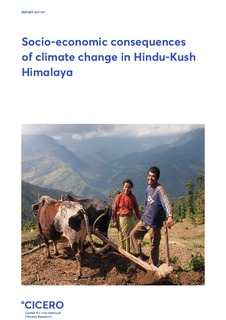Socio-economic consequences of climate change in Hindu-Kush Himalaya
| dc.contributor.author | Aaheim, H. Asbjørn | |
| dc.contributor.author | Dhakal, Kabindra | |
| dc.contributor.author | Orlov, Anton | |
| dc.date.accessioned | 2018-01-19T13:45:13Z | |
| dc.date.available | 2018-01-19T13:45:13Z | |
| dc.date.issued | 2017-11-13 | |
| dc.identifier.issn | 0804-4562 | |
| dc.identifier.uri | http://hdl.handle.net/11250/2478401 | |
| dc.description.abstract | The answer to how climate change will affect Hindu-Kush-Himalaya depends on whom you ask. Some will point at expected changes in climate, others will show what it may do to poor people, and some will express their concerns regarding the economies in the region. This report combines the three perspectives, and assesses the economic impacts of climate projections in China, India, Pakistan, Nepal, and Bangladesh to 2050. We further explore the consequences for smallholders of the projected changes in climate and resulting impacts on the socioeconomic drivers, based on survey in a local community in Nepal. The study points out reasons to expect that climate change will most likely affect smallholders much harder than indicated by economic indicators for their countries. Economic growth can be a successful way to improve the resilience of the population, but only if it benefits the poorest. | nb_NO |
| dc.language.iso | eng | nb_NO |
| dc.publisher | CICERO Center for International Climate and Environmental Research - Oslo | nb_NO |
| dc.relation.ispartof | CICERO Report | |
| dc.relation.ispartofseries | CICERO Report;2017:07 | |
| dc.subject | Climate change | nb_NO |
| dc.subject | Socioeconomic impacts | nb_NO |
| dc.subject | Adaptation | nb_NO |
| dc.subject | Smallholders | nb_NO |
| dc.title | Socio-economic consequences of climate change in Hindu-Kush Himalaya | nb_NO |
| dc.type | Research report | nb_NO |
| dc.description.version | publishedVersion | nb_NO |
| dc.subject.nsi | VDP::Social science: 200 | nb_NO |
| dc.source.pagenumber | 47 | nb_NO |
| dc.identifier.cristin | 1547685 | |
| dc.relation.project | HICAP | nb_NO |
Tilhørende fil(er)
Denne innførselen finnes i følgende samling(er)
-
CICERO Reports [210]
Reports published by CICERO
